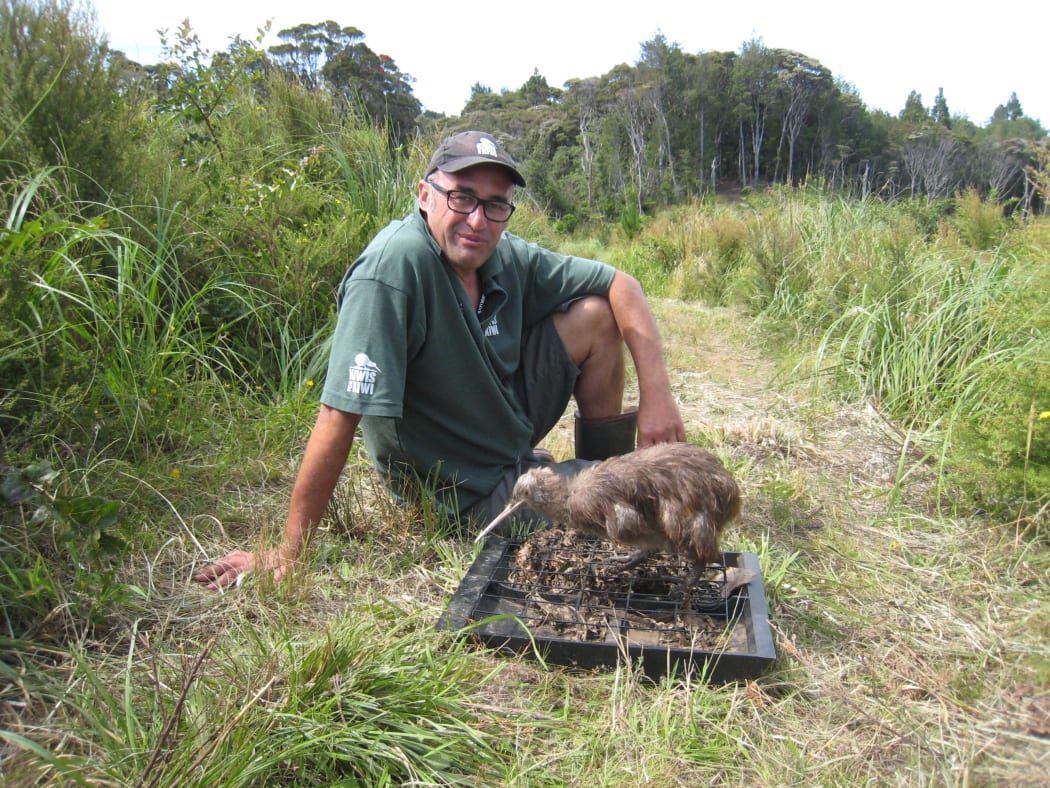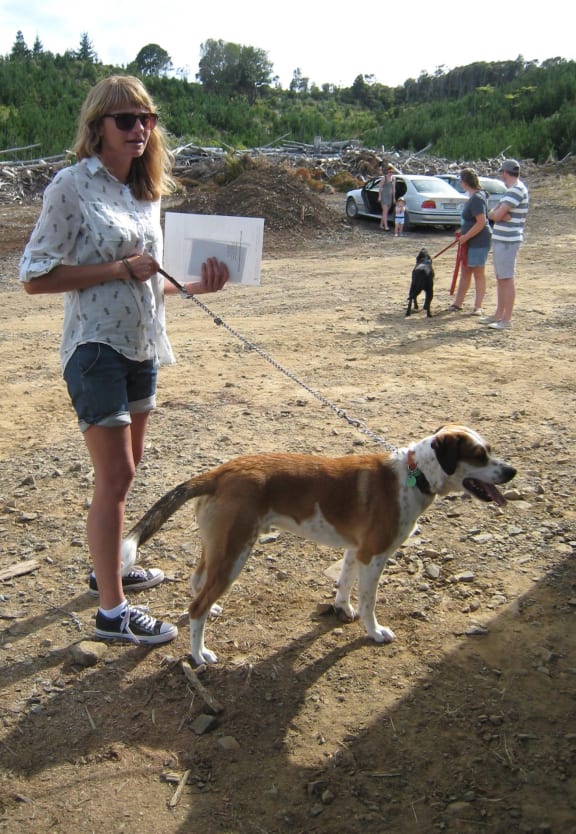By Lisa Thompson
"The best way to keep dogs away from kiwis is actually to keep them away from kiwis. On a lead is great because you know where he is; on the end of your arm." Department of Conservation ranger and kiwi dog aversion trainer Karl Fisher

Department of Conservation Ranger Karl Fisher with his training kiwi Roger. Roger, an adult Project Kiwi male, was hit by a car in 2013. He sits on a tray of freshly scented kiwi litter, which had been gathered from another Kuaotunu kiwi currently being raised by Kiwi Encounter in Rotorua. Photo: RNZ / Lisa Thompson
Project Kiwi Trust is a kiwi conservation initiative saving North Island brown kiwi in one of its last strongholds on the Kuaotunu Peninsula, on the Coromandel's east coast.
For Paula Williams, a manager of the trust, summer-time on the peninsula means vigilance. The trust looks after about 600 kiwi spread across 2,800 hectares of private and conservation-controlled land. Most of the year, the Thames-Coromandel District population is about 27,500 residents but in the peak summer season this number swells to upwards of 100,000 as holidaymakers flock to the area, many bringing their pet dogs.

Kuaotunu resident Leanne Quest and her rescue dog Louis after they completed the aversion training. Photo: RNZ / Lisa Thompson
On the Coromandel Peninsula, stoat trapping has been so successful, that dogs now pose the biggest danger to wild kiwi. “Kiwi do not have a breastplate, so even for a fox terrier to grab a kiwi and give it one shake is enough to kill it,” says Paula. “When we lose our adult kiwi the loss is huge because of what they can potentially contribute in terms of reproduction to the population, but also because it may take the remaining adult of a pair quite some time to establish another pair.”
In an effort to protect its kiwi stronghold on the peninsula, Paula and the Project Kiwi team recently challenged the local community to change its thinking around dog ownership via a call to action on the trust’s Facebook page. “If our resident dog owners were to become our greatest kiwi conservation advocates, a large part of the battle for survival would have been won.”
Not only are residents being encouraged to keep their dogs on leads and muzzle them if going into the bush, they’re also being urged to take part in kiwi avoidance training. “If we can recruit our locals then they can recruit their friends who holiday with them over the summer,” says Paula. “And it is that change in psyche that we need.”
And it seems the call is being heeded. In January 41 dogs received free training from Department of Conservation ranger Karl Fisher, with many coming from the local Kuaotunu area.
Set up throughout New Zealand about six years ago, aversion training is helping to reduce the threat dogs pose to wild kiwi with the aid of an electric collar. If a dog shows interest and goes within half its body length of a stuffed scented kiwi planted in nearby bush, Karl will issue a short shock to the dog via a remote controller.
“I don’t want to do it, but I have to,” says Karl. “The dog has to learn that kiwis bite and they quickly learn that kiwis are something to stay away from.“

Sheila and Chris Westley, pictured in the middle with their dog Missy who has undergone the aversion training, keep a clear sign at the entrance to their property. On the right, Coromandel holidaymaker Adele Anderson takes her Ridgeback dog Rocky through the training. Photo: RNZ / Lisa Thompson
“There’s no pass or fail, it’s just constant training and reinforcing. We have dogs that we’re interested in and want to see again and again and again and then there are some super dogs that get it straight away.”
However, owners are asked to bring their dogs back for a refresher course in 12 months, in order to cement the training. “People say it’s cruel but it’s not,” says Karl. “A dog doesn’t need much time or effort to kill a kiwi. Unfortunately, the effort in us protecting that kiwi is far greater. So all I ask is that you keep your dog on a lead and under control at all times.”

